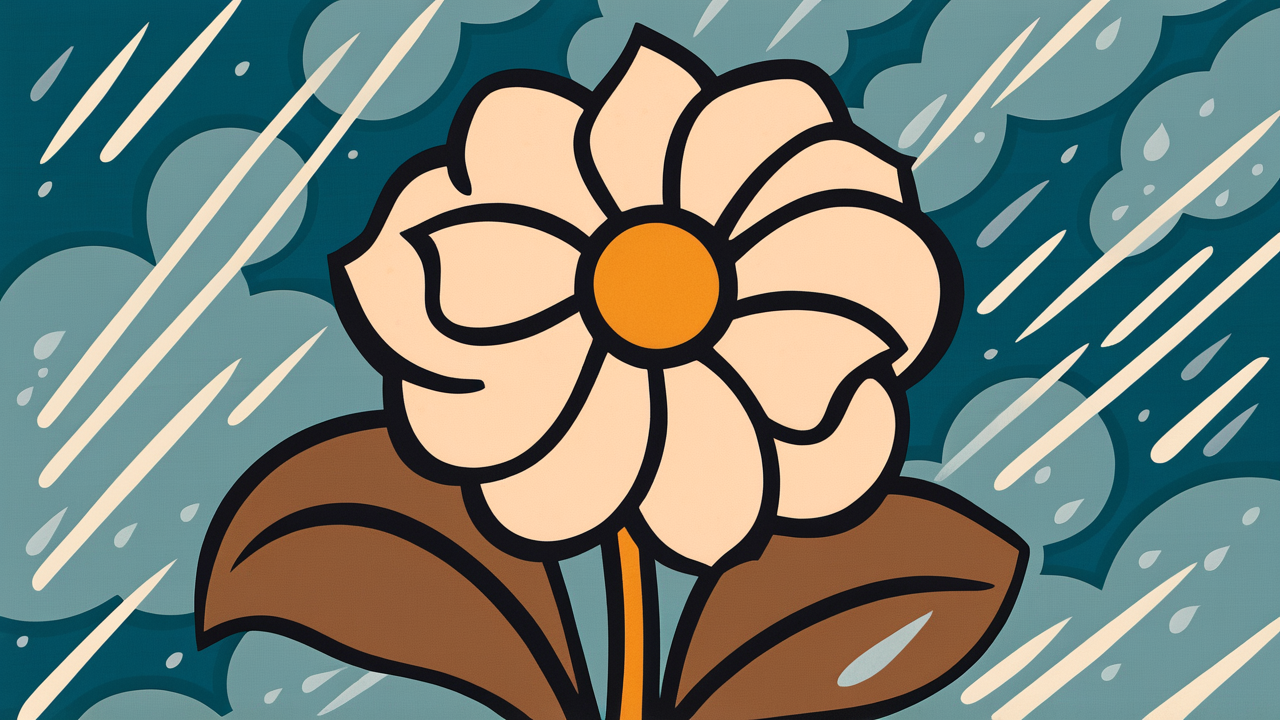How to Read “花に嵐”
Hana ni arashi
Meaning of “花に嵐”
“Flowers to storm” is a proverb meaning that beautiful things and good fortune are often accompanied by misfortune.
Just as beautiful flowers in full bloom are scattered by a sudden storm, this expression conveys that in life too, happy periods and smooth situations are prone to unexpected difficulties and disasters. This is not merely a pessimistic view, but has been used as wisdom for accepting life’s realities.
This proverb is used in situations when problems suddenly arise in things that were progressing smoothly, or when cautioning someone who is at the peak of happiness. It is also used to express the reality that the more beautiful or valuable something is, the more likely it is to face external attacks or interference. Even today, this expression fits perfectly when explaining situations where successful companies are suddenly hit by crises, or when unexpected trials visit lives that were sailing smoothly.
Origin and Etymology
“Flowers to storm” is a proverb born from Japan’s ancient view of nature and aesthetic sensibilities. This saying is based on the natural phenomenon of beautifully blooming flowers being scattered by sudden storms.
Since ancient times, Japanese people have felt deep emotion from the beauty and transience of flowers, especially cherry blossoms. Particularly from the Heian period onward, as flower-viewing culture developed, while people admired flowers in full bloom, they also held strong poignant feelings about how this beauty would not last long.
While this proverb is said to appear in literature from the Edo period onward, the underlying philosophy had been rooted in Japanese hearts from much earlier times. It is thought that Buddhist concepts of impermanence and the Japanese sensitivity to keenly perceive the changing of the four seasons gave birth to this expression.
Within the concise expression “Flowers to storm” lies the truth of life that the more beautiful something is, the more fragile it is, and the happier the time, the more likely misfortune is to befall. This can be said to be a word that well represents the characteristic of Japanese proverbs that express life lessons through natural phenomena.
Usage Examples
- Just when our new product was doing well, it was truly flowers to storm when a competitor announced a similar product
- The project was progressing smoothly, but this is exactly what flowers to storm means – sudden budget cuts were decided
Modern Interpretation
In modern society, the proverb “Flowers to storm” seems to be increasing in importance. This is because in the information age, while news of success and happiness spreads instantly, criticism and attacks against it are also disseminated at the same speed.
In the age of social media, it’s not uncommon for someone who became famous overnight to face backlash over trivial matters and fall from grace in an instant. This can truly be called the modern version of “Flowers to storm.” In business too, the moment a company creates a hit product, imitations appear, or successful companies become targets of cyber attacks – success and trials are two sides of the same coin.
However, in modern times, new interpretations of this proverb have also emerged. In today’s world where risk management concepts have developed, rather than simply accepting “Flowers to storm” as fate, it’s considered important to take preventive measures against predictable risks.
Also, with the spread of the concept of resilience (recovery ability), attention is focused on building the strength to endure and bounce back from storms, assuming they will come. In other words, the modern “Flowers to storm” is understood not as a word of resignation, but as a lesson teaching the necessity of preparation and countermeasures.
When AI Hears This
From a temporal philosophy perspective, “flowers in a storm” represents a worldview that’s diametrically opposed to Western concepts of time—where beauty derives its value not from “permanence” but from “transience.”
We typically seek value in things that last. But this proverb reveals a paradox: the storm acts as a “time compression device” that instantly ends the flower’s beauty, yet in doing so, transforms that beauty into eternal memory. Cherry blossoms scatter within a week, which is precisely why people desperately rush to view them each year, investing those brief moments with extraordinary meaning.
What’s fascinating is how the storm functions not merely as a destroyer, but as a “temporal editor.” If flowers slowly withered away, their beauty would gradually fade and memories would blur. But when a storm scatters them all at once, the most beautiful moment gets “perfectly preserved”—cut out from the flow of time and saved intact.
This represents a completely opposite time sensibility from our modern “instant culture.” While we tend to pursue convenience and efficiency, Japanese aesthetics teaches that true value lies within “ephemerality.” Flowers scattered by storms move us far more deeply than artificial flowers that bloom forever. Because it’s precisely the possibility of loss that makes each moment shine so brilliantly.
Lessons for Today
What “Flowers to storm” teaches modern people is the importance of mental preparation to accept life’s ups and downs as natural. If you are currently going through a smooth period, keep in mind that it may not continue forever. This doesn’t mean to become pessimistic. Rather, it’s a message to more deeply savor current happiness and maintain gratitude.
In modern society, we tend to pursue success and happiness as permanent things, but this proverb offers us a different perspective. When difficulties arise, it teaches us that they are a natural part of life and will surely pass.
What’s important is not to stop blooming flowers out of fear of storms, but to cultivate the strength to bloom flowers again even after storms come. Your life will have periods of beautiful flowers, and sometimes stormy periods too. But each season has meaning, and both are valuable experiences that help you grow.



Comments